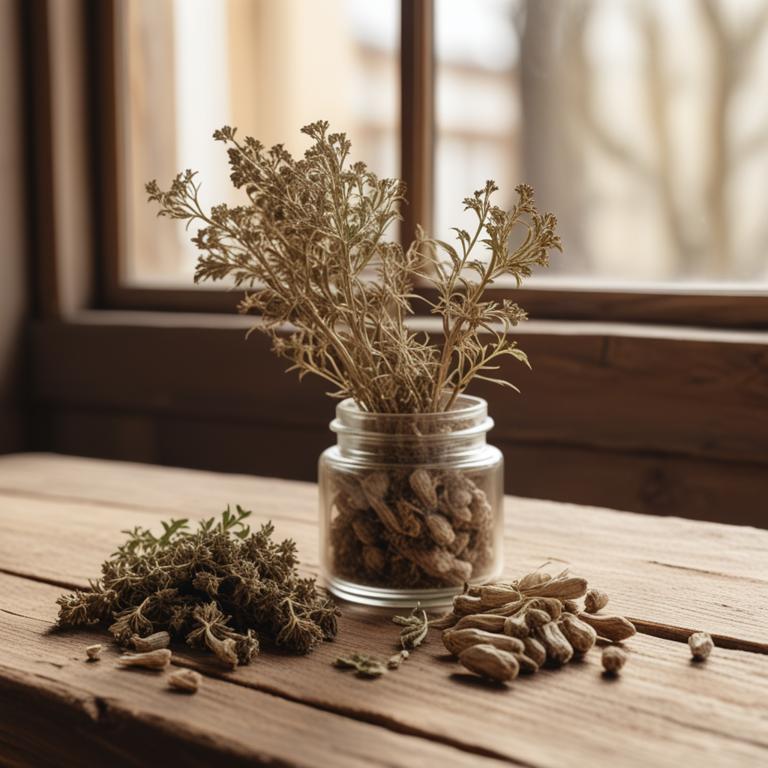Updated: Dec 1, 2024
Causes and Herbal Preparations of Viral Hepatitis: A Comprehensive Guide

Viral hepatitis is a serious liver infection caused by viruses such as hepatitis A, B, C, D, and E. It can lead to fatigue, loss of appetite, and yellowing of the skin and eyes.
In severe cases, it can cause liver failure, which can be life-threatening. Viral hepatitis is usually spread through contaminated food, water, and blood, and in some cases, it can be passed from mother to child during birth. Herbal remedies have been used for centuries to help manage the symptoms of viral hepatitis. Herbs like milk thistle, turmeric, and licorice root have anti-inflammatory properties that can help reduce liver inflammation and promote healing.
The roots of the milk thistle plant, in particular, contain silymarin, a compound that has been shown to protect the liver from damage and enhance its natural detoxification processes. To use these herbs, you can prepare teas by steeping dried roots and leaves in hot water. You can also take capsules or tinctures that contain concentrated extracts of the herbs. Some people also use herbal infusions, such as a combination of turmeric and ginger, to help soothe the digestive system and reduce nausea.
It's essential to consult with a healthcare professional before using herbal remedies, especially if you're already taking medication or have a severe case of viral hepatitis.
Table of Contents
- What initiates the condition known as viral hepatitis?
- What advantages come from using herbs to treat viral hepatitis?
- What are the most widely used medicinal herbs for the treatment of viral hepatitis?
- What are the commonly used herbal medications for viral hepatitis?
- What herbs are contraindicated for individuals with viral hepatitis?
- FAQ
What initiates the condition known as viral hepatitis?
The main causes of viral hepatitis are five different viruses that affect the liver in different ways.
Hepatitis C virus (HCV) is spread through contaminated blood, often through sharing needles or getting a tattoo with an infected needle. This is because the virus can survive outside the body for a short time and can be easily transmitted. Hepatitis B virus (HBV) is also spread through blood and body fluids, often through unprotected sex or sharing needles.
In rare cases, it can be spread from mother to child during birth. Hepatitis D virus (HDV) only infects people who already have HBV, as it uses the HBV to replicate itself. Hepatitis E virus (HEV) is spread through contaminated food and water, often in areas with poor sanitation. It's usually a short-term infection, but can be severe in pregnant women.
Hepatitis G virus (HGV) is not well understood, but is thought to be spread through blood and body fluids, similar to HCV.
What advantages come from using herbs to treat viral hepatitis?
Using certain herbs for viral hepatitis can be very beneficial.
One main advantage is that they can help reduce inflammation in the liver, which is often a major issue when dealing with this condition. These herbs may also boost the immune system, helping the body fight off the virus more effectively.
Additionally, they can help improve liver function and promote the production of new liver cells, which can replace damaged ones. Some of these herbs have antiviral properties, which means they can directly target and reduce the viral load in the body. This can lead to a faster recovery and a lower risk of complications.
Furthermore, these herbs are often natural and gentle on the body, which can be especially important for people who are sensitive to medications or have other health conditions.
What are the most widely used medicinal herbs for the treatment of viral hepatitis?

When it comes to viral hepatitis, herbs can be a great addition to your treatment plan.
Let's talk about some of the most effective ones. Glycyrrhiza glabra, also known as licorice root, has been shown to reduce liver inflammation and protect the liver cells from damage. It also has anti-viral properties that help combat the hepatitis virus. Phyllanthus niruri, or milk thistle, is known to improve liver function and promote the regeneration of liver cells. It's rich in antioxidants that help reduce oxidative stress and inflammation in the liver.
Curcuma longa, commonly known as turmeric, contains a powerful compound called curcumin. Curcumin has potent anti-inflammatory and anti-oxidant properties that help reduce liver inflammation and protect the liver from further damage. Andrographis paniculata, or king of bitters, has been used in traditional medicine for centuries to treat various liver and digestive issues. It has anti-inflammatory properties that help reduce liver inflammation and promote the healing of liver cells. Panax ginseng, also known as Asian ginseng, has been shown to improve immune function and reduce inflammation in the liver. It also has antioxidant properties that help protect the liver from oxidative stress.
These herbs work in different ways to help manage viral hepatitis, but they all have one thing in common: they can help reduce liver inflammation, promote liver regeneration, and combat the hepatitis virus.
What are the commonly used herbal medications for viral hepatitis?

When it comes to managing viral hepatitis, herbal preparations can be a helpful addition to your treatment plan.
A decoction is a liquid extract made by boiling herbs in water, which can be especially useful for conditions like viral hepatitis where the liver is involved. Herbs like milk thistle and dandelion root are often used in decoctions because they support liver health and help remove toxins. Herbal infusions, on the other hand, are made by steeping herbs in hot water, similar to tea. Infusions are great for soothing digestive issues and reducing inflammation, both of which can be problems for people with viral hepatitis. Herbs like peppermint and ginger are commonly used in infusions for their anti-inflammatory properties. Tinctures are concentrated liquid extracts made from herbs, often using a solvent like alcohol or glycerin. They're easy to take and can be absorbed quickly into the bloodstream, making them a good option for people who have trouble swallowing pills or capsules.
Tinctures of herbs like silymarin and licorice root are commonly used to support liver health and reduce inflammation. Capsules are a convenient way to take herbal preparations, especially for those who have trouble swallowing pills or tinctures. Capsules can be filled with dried herbs, powders, or tinctures, and are often used for herbs like milk thistle and turmeric, which support liver health and reduce inflammation. Suppositories are used rectally, making them a good option for people who have trouble absorbing nutrients or medications through their digestive system. They can be especially helpful for conditions like viral hepatitis, where the liver is involved and nutrients may not be absorbed properly. Herbs like goldenseal and echinacea are often used in suppositories to support immune function and reduce inflammation. When using herbal preparations, it's essential to work with a healthcare professional to ensure you're getting the right herbs and in the right amounts.
They can also help you avoid any potential interactions with medications or exacerbate any underlying conditions.
Additional Resources:
What herbs are contraindicated for individuals with viral hepatitis?
If you have viral hepatitis, it's crucial to be careful with certain herbs.
Rauvolfia serpentina, for example, is known to cause liver damage, which can be devastating for people with hepatitis. Its active compounds can increase liver enzymes, making the condition worse. Aristolochia clematitis, also known as birthwort, contains a toxic compound that can lead to kidney damage, but it can also harm the liver. This herb is especially problematic for people with viral hepatitis, as their liver is already under stress.
Cinchona officinalis, a plant commonly used for its antimalarial properties, can also be problematic for people with liver issues. It contains quinine, which can cause liver damage and make hepatitis symptoms worse. Aconitum carmichaelii, or monk's hood, is highly toxic and should be avoided by anyone with liver problems. Its active compounds can cause liver failure, which can be fatal. Daphne mezereum contains toxic compounds that can cause liver damage, as well as other health issues.
It's best to steer clear of this herb if you have viral hepatitis, as your liver needs all the protection it can get.
FAQ
Are there any specific herbs that can prevent viral hepatitis?
Some herbs, like milk thistle and dandelion root, are believed to help protect the liver from damage and support its natural healing process.
Milk thistle's active compound, silymarin, may help repair liver cells and reduce inflammation, while dandelion root can help stimulate bile production and promote liver function.
These herbs may help alleviate symptoms of viral hepatitis.
Is it safe to use herbal remedies for viral hepatitis during pregnancy?
Using herbal remedies during pregnancy can be risky, especially for viral hepatitis.
Some herbs can affect the baby's growth or cause other complications. For example, silymarin, found in milk thistle, can help with liver damage, but its effects on the baby are not well understood.
It's best to avoid herbal remedies altogether during pregnancy.
Are there any herbs that can reduce the frequency of viral hepatitis?
Some herbs, such as milk thistle, have been studied for their potential to reduce liver damage and inflammation caused by viral hepatitis.
Research suggests that milk thistle's active compounds may help protect liver cells and improve liver function.
However, more research is needed to confirm its effectiveness in reducing the frequency of viral hepatitis.
Can i combine different herbal remedies for viral hepatitis?
Combining herbal remedies for viral hepatitis is a bit tricky.
Some herbs can interact with each other or worsen your symptoms. For example, milk thistle might enhance the effects of silymarin, but it could also interact with other herbs like St. John's Wort.
It's best to start with small amounts and monitor your body's reaction.
Related Articles

Queasy Stomach Causes and Herbal Remedies: A Comprehensive Guide

Understanding Gastroenteritis: Causes, Medicinal Herbs, and Herbal Preparations

Cholecystitis: Causes, Symptoms, Medicinal Herbs, and Therapeutic Herbal Preparations

The Causes, Remedies, and Herbal Solutions for Bloating

Mucus in Stomach: Understanding the Causes and Medicinal Herbs for Relief






